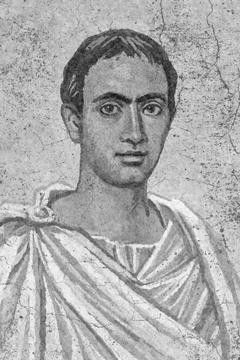Virgil: An Introduction
- Alexei Varah
- Jun 20, 2025
- 3 min read
On October 15, 70 BC, in the quiet, rural northern Italian village of Andes, the boy who would later be heralded as the voice of Roman glory was born: Publius Vergilius Maro. Known today as Virgil, Publius Vergilius came from humble beginnings, with parents who were not even Roman citizens. However, when Julius Caesar extended Roman citizenship to the region north of the Po River in 49 BC, Virgil officially became one step closer to achieving his status as one of Rome's foremost lyric poets. Yet, life remained uncertain for young Virgil, especially after Julius Caesar's assassination in 44 BC. Octavian, Caesar's heir who would later be renamed Emperor Augustus, seized large tracts of land in northern Italy to reward his soldiers, nearly displacing Virgil in the process.

Perhaps to cope with these early hardships, young Virgil turned to poetry, finding inspiration from the Greek poet Theocritus, which would influence his style for the rest of his career. Outside of merely reading poetry, Virgil's interest in pursuing verse was also formed during his boyhood education in Cremona. Later, after moving to Milan and rejecting a career in rhetoric and law, Vergil officially committed to pursuing poetry.
His first major work, the Eclogues (or sometimes referred to as the Bucolics), illustrates the profound influence Greek literature had on Virgil's style. Written in grand Homeric meter, Eclogues harkened back to Greek style. Yet, Virgil departs from Greek tradition in the content of his poems, focusing on idealized scenes of rural life instead of epic heroes' journeys. The Eclogues immediately captivated Roman readers and propelled Virgil's career, helping him catch the eye of Asinius Pollio, a powerful Roman politician who introduced Virgil to Octavian himself and secured him a top-tier education in Milan, Rome, and Naples.
Determined not to become a one-hit wonder, Virgil spent the next seven years crafting the Georgics, a four-book masterpiece dedicated to celebrating the beauty of simple agricultural life. With his expert use of imagery and metaphor, the Georgics earned Virgil high praise; the books were even read to Octavian in 29 BC, just two years before he became emperor. As English poet John Dryden would later write, the Georgics were indeed, at the time, "the best Poem by the best Poet."
Yet the Georgics were merely a prelude foreshadowing Virgil's magnum opus. In the third book, Virgil hints at his next endeavor, mentioning the "fiery fights of Caesar," a direct reference to what would later become the literary crown jewel of Rome: the Aeneid. Directly modeling Homer's epics, the Aeneid told the now-infamous tale of Aeneas, a Trojan hero fated to be found by the Romans. The poem served not just as myth but was transformed into a national epic, offering Rome a divine origin story and immortalizing Augustus' reign as a time of magnanimous literary achievement.
Tragically, Virgil, who had been sickly all his life, fell seriously ill in 19 BC on his voyage home to Italy from Greece. He would pass away on September 21 of that year and was buried near Naples. Reportedly, just before his death, Virgil asked that the unfinished Aeneid be destroyed. His long-time patron and now friend, Emperor Augustus, refused, ensuring the survival of both the epic and Virgil's legacy.
Not long after Virgil's death, the Aeneid became central to Roman culture and education, was taught in schools for centuries, and is still featured prominently in Latin curricula today. After the fall of the Roman Empire, Virgil's works would take on new meaning for Christian readers, who connected their prophecies to his verses. Centuries later, Dante would make Virgil the wise and noble guide through Hell in The Divine Comedy, inextricably linking the Roman poet to salvation's spiritual journey.
Beyond just his words, Virgil himself would shape the very arc of poetic careers stretching even into modern day. His evolution from pastoral musings to national epics inspired the likes of John Milton, William Wordsworth, Alexander Pope, and countless others. Hopefully, this brief biography has provided you with an introduction to this revolutionary Roman poet. As always, please leave a comment with any additional facts you think we should include and suggestions for poems of Virgil you'd like to see analyzed!



Comments